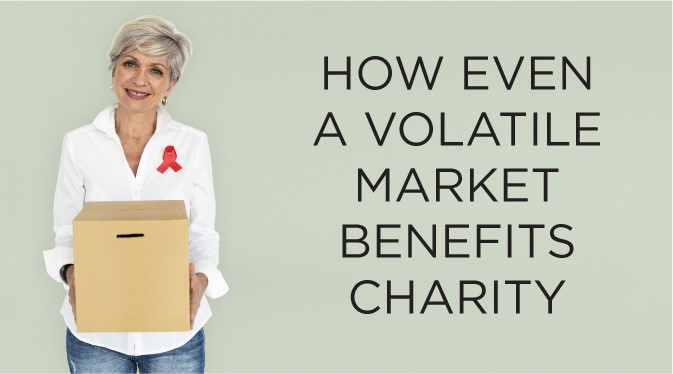How Even a Volatile Market Benefits Charity
Imagine a world where everything is totally free. At first blush you may think it would be a world without scarcity or want. The mechanics seem pretty simple—you need a giver and a receiver (beneficiary). And if it’s truly a gift, the giver abandons the item or service with no strings attached. It’s interesting to dream of a society without money exchanges, but we only need to ask, “What does the giver receive?” and the system breaks down. In looking at giving and receiving, let’s explore why society and charities actually need the marketplace to thrive.
What the Receiver Gets
It may seem obvious, but giving hinges on how the receiver measures the value of the gift. For it to be a true gift, the beneficiary person or organizations see themselves as better off having the gift than turning it away. It’s obvious that some gifts should be rejected (see Trojans who should have said no to the Greek’s giant horse). So, the true value of the gift can only be measured by the receiver. If you give me a bunch of potatoes and I don’t need them (assuming I can’t trade them for something else), the value dramatically declines.
What the Donor Gets
Altruism is giving without concern for yourself; just the wellbeing of others. But does altruism even really exist if the giver always gets something from the transaction? When someone gives to charity, they literally think the charity should have the money rather than keeping it for themselves. But, it’s likely the donor also receives something on the following list:
- • Psychological benefits or “helper’s high” (sense of purpose, increased happiness, lower stress levels)
- • Social status, reputation, connection, trust, and networking
- • Alternate rewards (tax breaks)
So here’s the big question: if even the simplest gift can give us an altruistic buzz, does that take away from the nobility of our actions? Hmm. . . .can we be noble and selfish at the same time? You’ll have to work that paradox out in your own mind. We do know that giving without pleasure is unnatural and difficult to achieve, so any charitable situation likely benefits both sides.
“It is one of the beautiful compensations of life,” said Ralph Waldo Emerson, “that no man can sincerely help another without helping himself.”
The Role of the Marketplace
What happens when giving and receiving get more complex?
Sometimes “gifts” are produced through a process involving the cooperation of many people—the decision to make a gift is not necessarily made by one person at a moment’s notice. When we dream of a world where everything is free, the production process is one of the huge problems we run into. If everyone is giving their products away, where would labor come for complex items?
Communism can be viewed as a form of “radical altruism” or an attempt at something similar (every individual abandon his or her wellbeing for the good of society), but it comes at a heavy price. A pure gift economy would by definition be an economy without exchange, and thus without market prices. Yet market prices guide us to produce one type of good (bringing higher revenue) rather than another (bringing lower revenue); and we make choices not to use certain goods because they cost too much to buy.
In a pure gift economy, this guidance would no longer exist. It would need to be replaced by a great sense of judgment and great discipline on the part of all members of society—uh, not a likely scenario. Division of labor would need to somehow be equal and the labor force self-disciplined—and the more complex society gets, the more factors are involved. The good news (or not so good news) is that progress and technology would slow, and in that way society would become less complex. Revised from Charity Needs Markets, Mises Institute.
In a vigorous and open marketplace, competition does a remarkably good job of motivating labor forces and spurring companies to innovate and become more efficient. And philanthropy survives because the giver is also the receiver.
Today philanthropy’s purpose is to fill gaps created by market failures. In the same way capitalism is an effective way to produce goods and services; private philanthropy is a good way to produce social benefit (Jeff Raikes, Raikes Foundation).
Just because markets are needed for balance in society, doesn’t mean you have to use them to fund your retirement.
Because this is just one example of volatility, how can you take an interest in the ups and downs of corporations and the market without your investments taking a direct hit? We know a way. We always recommend that you build your wealth outside of Wall Street and use your expendable money to play the market. The best way to do that is called the Perpetual Wealth Strategy that allows you to grow your wealth, access cash value, and leave a legacy for your family. The keystone to this strategy is found in a well-planned whole life insurance policy with a paid-up cash addition.
Let us tell you more about this strategy. Take a few minutes to learn about the Perpetual Wealth Strategy. It’s our mission to provide you with financial education. We invite you to take 2 minutes to sign up for a FREE, extensive eCourse called Infinite 101®. You’ll receive access to video tutorials, articles, and podcasts. It literally costs you nothing to become educated on this ideal financial strategy and start changing your wealth paradigm!
Take advantage of this FREE resource by clicking below.








